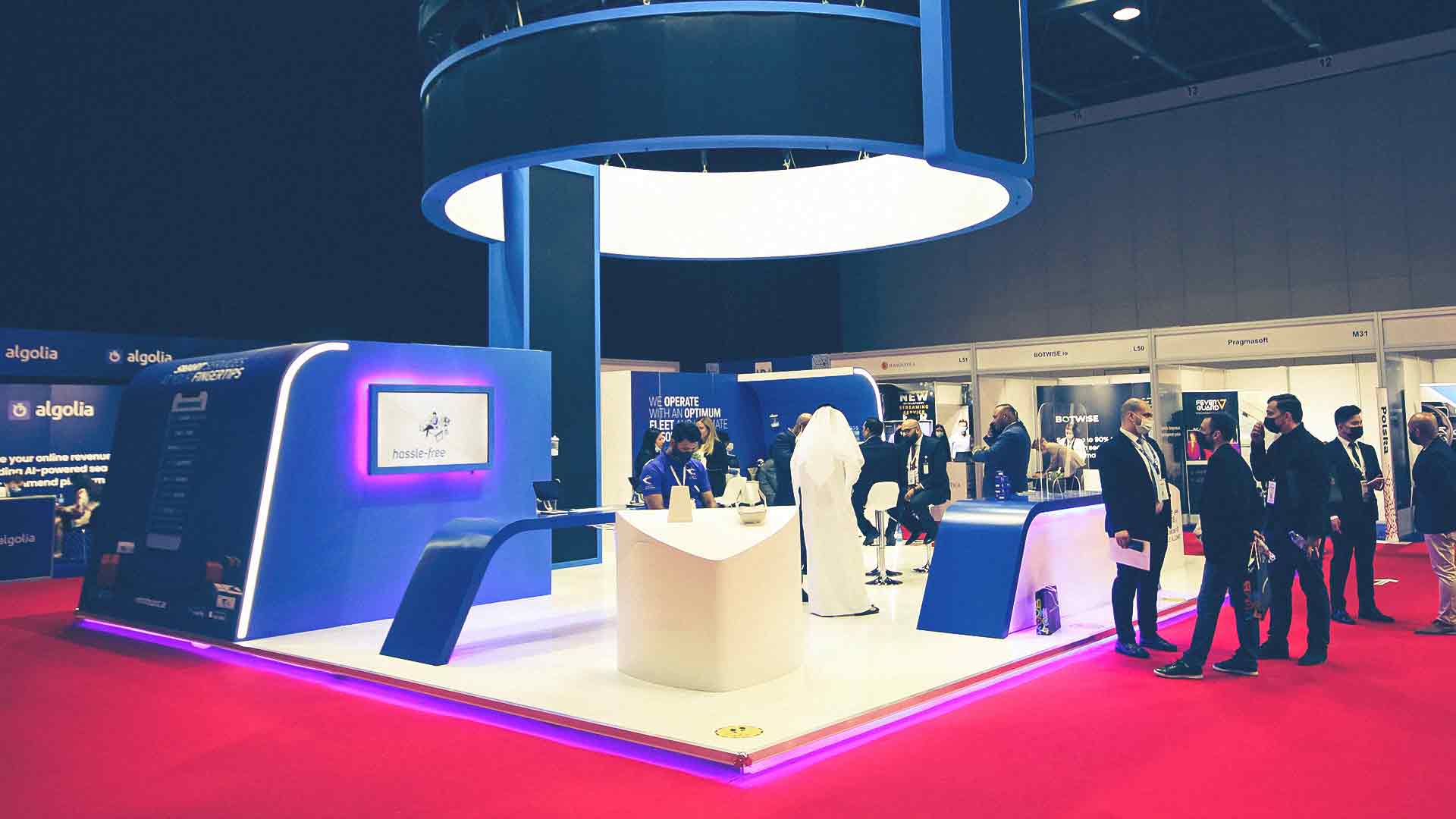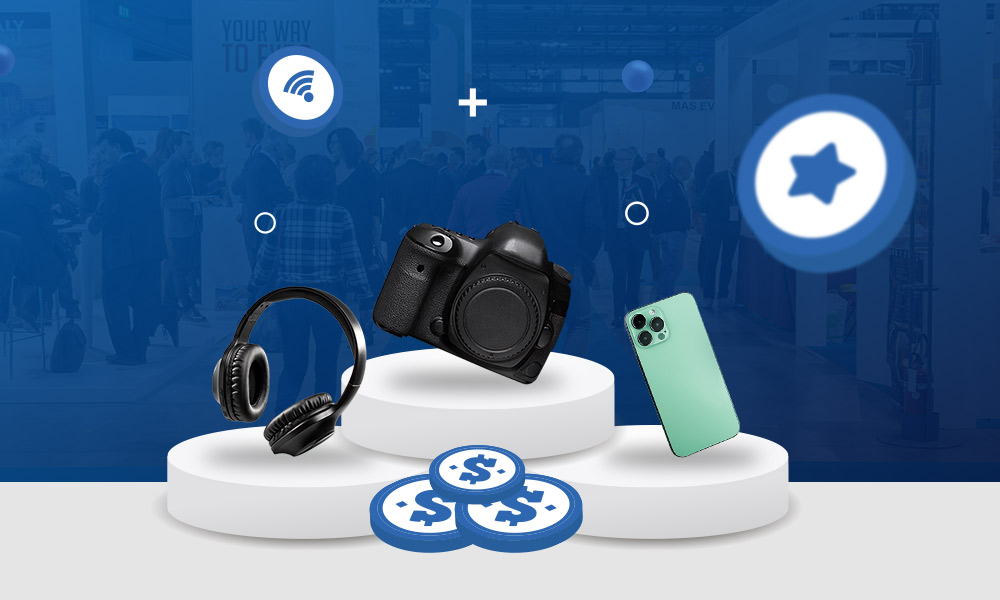Why Trade Shows Are So Popular For B2B Marketing?

Ever wonder why trade shows are so popular for B2B marketing in today’s digital age? Trade shows provide a powerful platform to break through the online noise. Imagine directly connecting with qualified leads, showcasing your products with impact, and building trust all in one dynamic environment. Trade shows offer this and much more, making them a potent tool for B2B success.
Top reasons why trade shows are so popular for B2B marketing
Learn more about the unique advantages trade shows provide and why they remain a favored strategy for B2B marketers seeking to boost brand visibility and forge meaningful business connections.
Building Relationships and Trust

In the dynamic arena of B2B marketing, the irreplaceable value of face-to-face interactions is vital. At the core of every flourishing business relationship lies a strong foundation of trust and comprehension—qualities best nurtured in person. Trade shows begin as a distinctive platform where such dynamics emerge, marrying traditional engagement with modern innovation to forge lasting connections.
Face-to-Face Interactions
The power of meeting people in person at trade shows cannot be overstated—it’s a great way to make personal connections that matter. These interactions allow trade show attendees to gain trust and a shared understanding that’s hard to achieve through screens. Here, every handshake, every exchange of business cards, and every shared glance adds a personal touch that can turn prospective leads into valued partners.
At these events, it’s not just about who you meet but also how you connect with them. Showcasing a new product through live demonstrations can speak volumes more than any online ad. Direct, personal engagement allows B2B marketers to stand out and be remembered long after the trade show ends.
Indeed, success stories from trade shows often feature businesses that make a lasting impression on potential clients. For instance, a software company can capture the attention of trade show attendees by showcasing its latest solutions, addressing their specific needs in real time. This approach demonstrates the product’s value and builds a foundation of trust with prospective leads, significantly boosting the chances of a successful sale.
Networking Opportunities for Marketers
Trade shows are key events for meeting potential buyers, making them one of the best ways to generate new leads. These gatherings bring together decision-makers and industry professionals eager to catch up on the latest innovations and solutions. Being there allows B2B marketers to engage directly with a concentrated pool of potential clients.
These events emphasize the importance of sharing knowledge and collaborating across industries. They serve as a melting pot for innovation, where companies can exchange ideas, spot emerging trends, and lay the groundwork for future partnerships. This fosters a culture of mutual advancement and opens doors for all involved.
Having a plan is crucial to making the most of these networking opportunities. Smart tactics include preparing a straightforward pitch highlighting what you offer, identifying key attendees in advance, and following up quickly after the show with tailored messages to reinforce connections. Getting involved in panel talks, workshops, and discussions also stands out as a smart move to boost your visibility and draw interest from industry peers.
Generating Leads and Boosting Sales

Trade shows stand out as a powerful tool for generating leads and boosting sales. They offer direct access to a concentrated group of qualified leads and a captive audience actively in search of solutions that your business can provide. It compares their effectiveness with broader digital marketing efforts and shares best practices for maximizing impact.
Targeted Audience Engagement and Giveaways
The magnetic pull of trade shows stems from their capacity to gather an audience specifically aligned with the industry’s focus. These venues are hotspots for industry leaders, decision-makers, and influencers looking for the newest product offerings, services, and tech innovations.
For B2B enterprises, this scenario is golden. It opens the door to direct interactions with prospective clients already showing interest in their solutions, streamlining the sales process and enhancing lead generation efficiency.
In contrast, despite its broad scope, digital marketing often needs to catch up on instant engagement and the ability to swiftly assess potential leads as trade shows do. The concentrated setting of a trade show amplifies lead generation outcomes due to the immediacy and specificity of face-to-face interactions.
To capitalize on this, successful tactics for generating leads at trade shows incorporate enticing attendees with interactive live demonstrations, giveaways, and contests. These strategies draw in more visitors and ensure a lasting impression, paving the way for effective lead qualification and follow-ups.
Demonstrating a breakthrough software, for example, can instantly communicate its benefits to a prospective customer, proving to be a more potent lead-generation strategy than conventional online marketing approaches.

Product Demonstrations and Showcases
Trade shows offer a unique platform for product demonstrations and showcases, allowing businesses to present their offerings in an interactive and immersive environment. By allowing potential clients to experience products or services first-hand, companies can effectively communicate their value proposition and differentiate themselves from competitors.
This setup provides the perfect stage for live demonstrations and hands-on experiences, which can significantly influence purchase decisions. The impact of live demonstrations on purchase decisions cannot be overstated. They offer a tangible experience that online product descriptions or video demos cannot contest.
For example, a manufacturer of industrial machinery can demonstrate its efficiency and safety features in real time and address any queries or concerns on the spot. This direct contact builds confidence in the product and the brand, drives sales, and enhances customer satisfaction.
Creative and engaging exhibition booths are crucial in attracting attendees and driving sales. Innovative booth designs that reflect the brand’s identity and value proposition can make a significant difference.
Incorporating interactive elements, such as virtual reality demonstrations or interactive touch screens, can further engage visitors, making the booth memorable and increasing the likelihood of conversion.
Brand Awareness and Market Visibility

Boosting your brand’s recognition and standing out in a crowded B2B market demands innovative strategies that grab and hold the attention of your ideal customers.
Trade shows are a prime opportunity for your business to highlight what makes it unique. By designing a captivating trade show booth, you can reflect your brand identity, display innovation, and establish yourself as a leader in your field.
Let’s explore how trade shows can be leveraged to enhance brand visibility, engage with the audience creatively, and position your company as a thought leader.
Standing Out from the Crowd with Signage
In the dynamic atmosphere of a trade show, making your mark with innovative signage becomes essential. The challenge of distinguishing your brand in a crowded marketplace can decisively influence your event’s outcome.
Signage that incorporates creative booth elements and interactive experiences is vital in drawing the crowd’s gaze. By constructing a display that mirrors your brand’s essence and offers an engaging, tactile journey, you attract more onlookers, create excitement, and imprint a memorable image.
Elevating your space with storytelling signage that weaves in your brand’s narrative and unique selling points can transform your exhibit into the event’s highlight. Immersive activations, from live demos to interactive games or virtual explorations, further enhance visitor engagement and make your presence unforgettable.
Industry Thought Leadership
Trade shows are an excellent platform for establishing your brand as a thought leader and industry expert. Participation in speaker sessions, workshops, and panel discussions allows you to share your insights and expertise with a captive audience and positions your brand as an authority in your field. This visibility is invaluable in building brand trust and market credibility, essential to long-term business success.
If you engage in these thought leadership opportunities, you can address current industry trends, challenges, and innovations, showcasing your company’s knowledge and commitment to advancing the industry. This approach enhances your brand’s reputation among peers and potential clients and fosters a sense of trust and reliability, making your business a go-to source for expertise and solutions.
The translation of thought leadership into brand trust and market credibility cannot be underestimated. Customers and partners are more likely to engage with brands that deeply understand their needs and the industry.
Showcasing your expertise at trade shows through insightful presentations and meaningful discussions solidifies your position as a leader, paving the way for increased brand loyalty and customer engagement.
The Evolving Landscape of Trade Shows

The landscape of trade shows is undergoing a significant transformation, propelled by the rise of hybrid and virtual options. This evolution is expanding the reach of trade shows, making them more accessible and cost-effective than ever before.
Furthermore, adopting data-driven strategies revolutionizes businesses’ participation in these events, enabling more targeted and efficient marketing efforts. Let’s explore how these developments are shaping the future of trade shows in B2B marketing.
Hybrid and Virtual Trade Shows: The Future of B2B Marketing
The introduction of hybrid and virtual trade shows marks a significant evolution in the landscape of these events. By blending the conventional aspects of physical trade shows with the power of the internet, these innovative formats extend the reach to a global audience and add a layer of flexibility for participants to interact with content and fellow attendees online.
The benefits of adopting hybrid and virtual models are manifold. With the elimination of physical boundaries, attendees from any location can engage, broadening the potential for B2B companies to amplify their market footprint. The efficiency and cost savings associated with online participation also contribute to a greater return on investment, as expenses related to travel, accommodations, and traditional booth setups are significantly reduced.
In aligning with your B2B marketing objectives, it’s crucial to weigh your target demographic’s inclinations, the characteristics of your offerings, and the desired level of interactivity. Hybrid events stand out for combining extensive reach with the irreplaceable value of in-person encounters, which is vital for finalizing transactions. Conversely, virtual events excel in expanding lead generation and facilitating connections across a worldwide platform.
Data-Driven Strategies
Adopting data-driven strategies is another key trend in the evolving landscape of trade shows. Data and analytics allow businesses to track outcomes more accurately, optimize future participation, and tailor their approaches based on real insights.
The importance of data in enhancing trade show participation cannot be overstated. By analyzing visitor engagement metrics, lead qualification processes, and ROI measurement, companies can gain valuable insights into what works and what doesn’t. This information is crucial for refining marketing strategies, improving booth design, and enhancing engagement tactics.
To maximize success, exhibitors should collect data that offers insights into attendee behaviors, preferences, and interactions. Tracking the most visited areas of your virtual booth, the most downloaded resources, or the sessions with the highest engagement can provide clues on how to improve future exhibitions. Additionally, conducting post-event surveys can offer direct feedback from participants, further informing your strategy.
Encouraging a data-driven approach among exhibitors leads to more successful trade show outcomes and contributes to a culture of continuous improvement. By embracing the insights data analytics provides, B2B marketers can ensure that their trade show investments are strategic and effective.
Key Takeaways
- Human Connections: Trade shows forge direct human connections, showcase products, and foster partnerships, which are vital for B2B success.
- Personal Engagement: In-person interactions build trust, grasp client needs, and nurture lasting relationships, surpassing digital channels.
- Lead Generation: Trade shows efficiently generate sales leads through demos, exhibits, and personalized engagement, enhancing sales.
- Brand Visibility: Participation elevates brand visibility, establishing thought leadership through innovative engagement.
- Adapting Strategies: Hybrid and virtual trade shows, coupled with data-driven approaches, broaden reach and effectiveness and improve new business acquisition and referral.
Understanding why trade shows are so popular for B2B marketing is key for business owners looking to spur business growth and forge strong business relationships. These events are unmatched in their capacity to promote direct interaction and showcase innovations, providing a robust platform for visibility and lead generation.
Trade shows merge the personal touch of real interactions with digital reach, creating a powerful tool for any business aiming to stand out. They open avenues for businesses to connect meaningfully, push brand growth, and cement their industry position. Embrace trade shows as a strategic move to unlock potential and drive your business forward.
Why are trade shows important in B2B?
Trade shows are vital in B2B for direct customer engagement, lead generation, showcasing new products or services, and offering insights into market trends, thereby serving as a key component for growth and innovation.
Why do businesses go to trade shows?
Businesses attend trade shows to network, showcase products/services, generate leads, stay updated on industry trends, and build brand awareness. Face-to-face interactions foster trust and credibility, facilitating business partnerships and sales opportunities. Additionally, trade shows offer valuable market research insights and opportunities for competitor analysis.
Are trade shows still worth the investment?
Trade shows remain valuable for B2B businesses despite digital advancements. They offer face-to-face interactions, lead generation, and industry networking opportunities. However, success depends on strategic planning and aligning with business objectives. Evaluate ROI, target audience relevance, and potential digital integration for optimal outcomes.
Grow your business with Blue Atlas. We are experts in trade show marketing for B2B. Make solid connections and get noticed. Want to see significant changes? Contact us today to learn more about our trade show marketing services.






